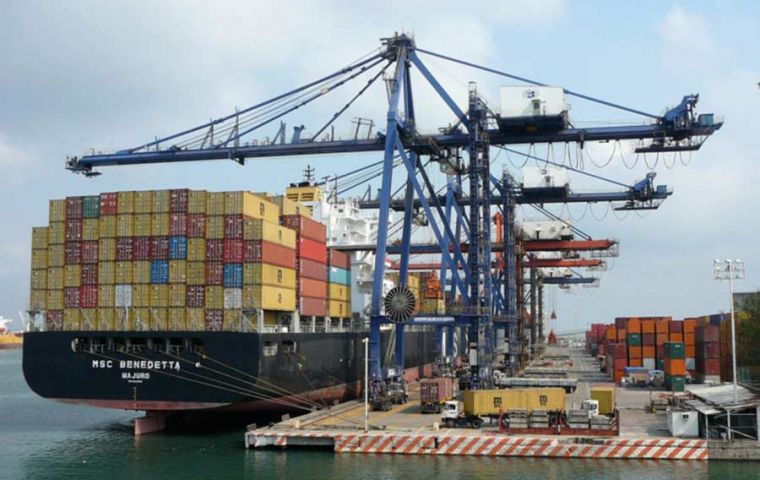MercoPress. South Atlantic News Agency
Brazil expects a slowdown of China trade, but will still enjoy a healthy surplus
 From January to April 2022, the value of Brazilian exports grew 24.1% compared to the same period in 2021. Imports advanced 27.6%.
From January to April 2022, the value of Brazilian exports grew 24.1% compared to the same period in 2021. Imports advanced 27.6%. Brazil expects a slower growth of exports this year as China implements strict lockdown measures to contain the spread of Covid-19. Nevertheless, China will help to boost Brazil's trade surplus points out Foreign Trade Indicator (Icomex) data, released by Getulio Vargas Foundation (FGV), the country's leading think tank..
From January to April 2022, the value of Brazilian exports grew 24.1% compared to the same period in 2021. Imports advanced 27.6%.
In terms of volume, Brazilian exports increased by 3.5% from January to April 2022 compared to January to April 2021, while the value of imports shrank 3.5%.
Such a disparity is explained by the increase in prices: for example, export prices rose 19.6% from January to April, while import prices increased by 32.2%.
“Global inflationary pressures are being exacerbated by the lockdown mandated by China to contain the pandemic. At the same time, the slowing of China’s economy may slow the growth of Brazilian exports, but not to the extent of a total dip in sales to China. Transactions with China will continue to represent most of Brazil’s trade surplus,” assessed FGV.
“In addition to the war in Ukraine, the new lockdown in China has intensified the bottlenecks that had not yet been overcome in global supply chains, leading to new inflationary pressures.”
Between April 2021 and 2022, Brazilian exports, grew in value by 10.7%, and imports 29%. The rise in the value of imports is explained by a 35.4% increase in prices, followed by a 5% drop in volume. Export prices rose 21.1%, and volume dropped 9%.
“There was a decrease in trade volume and a rise in prices in both exports and imports,” pointed out FGV.
The Icomex report mentions that, after the initial shock caused by the new coronavirus pandemic, international prices steadily increased in early 2021, driven by the global rebound of demand.
“For Brazil, the 8.1% growth in China’s GDP pushed up commodity demand, making month-to-month variations increasingly larger in the international arena, with export prices rising faster than import prices,” recalled FGV. “This behavior changed from the end of 2021 onwards. From that point on, the changes in imported prices started to exceed those of exports.”
The current lockdown imposed on Chinese cities could limit the Asian country’s economy, adding to a decline in international pricing. New challenges in supply chains and logistics channels, on the other hand, “indicate that consequences will not be immediate and will be of limited relevance for this year.”
“However, the effect of reduced commodity demand remains, which influences the country’s level of economic activity. It would not be good news for Brazil’s exports, like iron ore companies,” commented FGV in regard to the effects of the lockdown in China.
From January to April, the volume exported by Brazil to China fell by 9.6% compared to the same period in 2021. However, foreign sales to the United States (7.7%), European Union (10.2%), and Argentina (6.7%) expanded.
On the other hand, the volume imported from China rose 4% from January to April, while Brazil bought less from the United States (-5.4%), the European Union (-3.5%), and Argentina (-9.5%).
FGV recalls that Brazil exported less iron ore to China but that the Chinese increased their beef purchases.
“Even with the retraction of the Chinese economy, the country should maintain its leadership position in Brazilian foreign trade,” predicted the Icomex report.




Top Comments
Disclaimer & comment rulesCommenting for this story is now closed.
If you have a Facebook account, become a fan and comment on our Facebook Page!